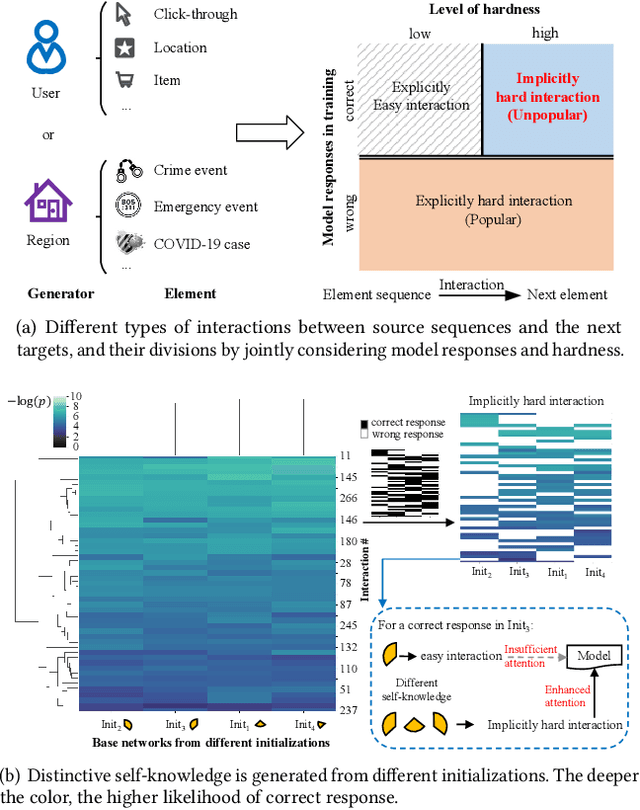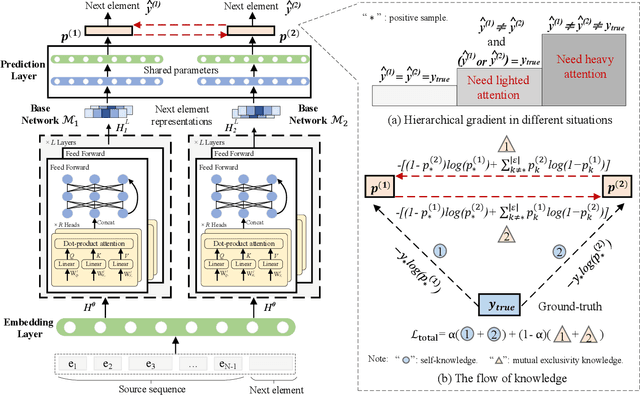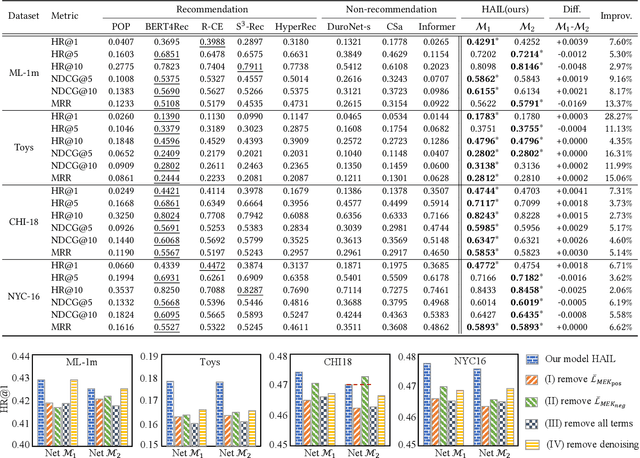Qing Xie
SDR-CIR: Semantic Debias Retrieval Framework for Training-Free Zero-Shot Composed Image Retrieval
Feb 05, 2026Abstract:Composed Image Retrieval (CIR) aims to retrieve a target image from a query composed of a reference image and modification text. Recent training-free zero-shot methods often employ Multimodal Large Language Models (MLLMs) with Chain-of-Thought (CoT) to compose a target image description for retrieval. However, due to the fuzzy matching nature of ZS-CIR, the generated description is prone to semantic bias relative to the target image. We propose SDR-CIR, a training-free Semantic Debias Ranking method based on CoT reasoning. First, Selective CoT guides the MLLM to extract visual content relevant to the modification text during image understanding, thereby reducing visual noise at the source. We then introduce a Semantic Debias Ranking with two steps, Anchor and Debias, to mitigate semantic bias. In the Anchor step, we fuse reference image features with target description features to reinforce useful semantics and supplement omitted cues. In the Debias step, we explicitly model the visual semantic contribution of the reference image to the description and incorporate it into the similarity score as a penalty term. By supplementing omitted cues while suppressing redundancy, SDR-CIR mitigates semantic bias and improves retrieval performance. Experiments on three standard CIR benchmarks show that SDR-CIR achieves state-of-the-art results among one-stage methods while maintaining high efficiency. The code is publicly available at https://github.com/suny105/SDR-CIR.
Enhancing Transferability and Consistency in Cross-Domain Recommendations via Supervised Disentanglement
Jul 23, 2025Abstract:Cross-domain recommendation (CDR) aims to alleviate the data sparsity by transferring knowledge across domains. Disentangled representation learning provides an effective solution to model complex user preferences by separating intra-domain features (domain-shared and domain-specific features), thereby enhancing robustness and interpretability. However, disentanglement-based CDR methods employing generative modeling or GNNs with contrastive objectives face two key challenges: (i) pre-separation strategies decouple features before extracting collaborative signals, disrupting intra-domain interactions and introducing noise; (ii) unsupervised disentanglement objectives lack explicit task-specific guidance, resulting in limited consistency and suboptimal alignment. To address these challenges, we propose DGCDR, a GNN-enhanced encoder-decoder framework. To handle challenge (i), DGCDR first applies GNN to extract high-order collaborative signals, providing enriched representations as a robust foundation for disentanglement. The encoder then dynamically disentangles features into domain-shared and -specific spaces, preserving collaborative information during the separation process. To handle challenge (ii), the decoder introduces an anchor-based supervision that leverages hierarchical feature relationships to enhance intra-domain consistency and cross-domain alignment. Extensive experiments on real-world datasets demonstrate that DGCDR achieves state-of-the-art performance, with improvements of up to 11.59% across key metrics. Qualitative analyses further validate its superior disentanglement quality and transferability. Our source code and datasets are available on GitHub for further comparison.
LGD: Leveraging Generative Descriptions for Zero-Shot Referring Image Segmentation
Apr 20, 2025



Abstract:Zero-shot referring image segmentation aims to locate and segment the target region based on a referring expression, with the primary challenge of aligning and matching semantics across visual and textual modalities without training. Previous works address this challenge by utilizing Vision-Language Models and mask proposal networks for region-text matching. However, this paradigm may lead to incorrect target localization due to the inherent ambiguity and diversity of free-form referring expressions. To alleviate this issue, we present LGD (Leveraging Generative Descriptions), a framework that utilizes the advanced language generation capabilities of Multi-Modal Large Language Models to enhance region-text matching performance in Vision-Language Models. Specifically, we first design two kinds of prompts, the attribute prompt and the surrounding prompt, to guide the Multi-Modal Large Language Models in generating descriptions related to the crucial attributes of the referent object and the details of surrounding objects, referred to as attribute description and surrounding description, respectively. Secondly, three visual-text matching scores are introduced to evaluate the similarity between instance-level visual features and textual features, which determines the mask most associated with the referring expression. The proposed method achieves new state-of-the-art performance on three public datasets RefCOCO, RefCOCO+ and RefCOCOg, with maximum improvements of 9.97% in oIoU and 11.29% in mIoU compared to previous methods.
Stealthy and Robust Backdoor Attack against 3D Point Clouds through Additional Point Features
Dec 10, 2024Abstract:Recently, 3D backdoor attacks have posed a substantial threat to 3D Deep Neural Networks (3D DNNs) designed for 3D point clouds, which are extensively deployed in various security-critical applications. Although the existing 3D backdoor attacks achieved high attack performance, they remain vulnerable to preprocessing-based defenses (e.g., outlier removal and rotation augmentation) and are prone to detection by human inspection. In pursuit of a more challenging-to-defend and stealthy 3D backdoor attack, this paper introduces the Stealthy and Robust Backdoor Attack (SRBA), which ensures robustness and stealthiness through intentional design considerations. The key insight of our attack involves applying a uniform shift to the additional point features of point clouds (e.g., reflection intensity) widely utilized as part of inputs for 3D DNNs as the trigger. Without altering the geometric information of the point clouds, our attack ensures visual consistency between poisoned and benign samples, and demonstrate robustness against preprocessing-based defenses. In addition, to automate our attack, we employ Bayesian Optimization (BO) to identify the suitable trigger. Extensive experiments suggest that SRBA achieves an attack success rate (ASR) exceeding 94% in all cases, and significantly outperforms previous SOTA methods when multiple preprocessing operations are applied during training.
CrimeAlarm: Towards Intensive Intent Dynamics in Fine-grained Crime Prediction
Apr 10, 2024



Abstract:Granularity and accuracy are two crucial factors for crime event prediction. Within fine-grained event classification, multiple criminal intents may alternately exhibit in preceding sequential events, and progress differently in next. Such intensive intent dynamics makes training models hard to capture unobserved intents, and thus leads to sub-optimal generalization performance, especially in the intertwining of numerous potential events. To capture comprehensive criminal intents, this paper proposes a fine-grained sequential crime prediction framework, CrimeAlarm, that equips with a novel mutual distillation strategy inspired by curriculum learning. During the early training phase, spot-shared criminal intents are captured through high-confidence sequence samples. In the later phase, spot-specific intents are gradually learned by increasing the contribution of low-confidence sequences. Meanwhile, the output probability distributions are reciprocally learned between prediction networks to model unobserved criminal intents. Extensive experiments show that CrimeAlarm outperforms state-of-the-art methods in terms of NDCG@5, with improvements of 4.51% for the NYC16 and 7.73% for the CHI18 in accuracy measures.
MealRec: A Meal Recommendation Dataset
May 24, 2022



Abstract:Bundle recommendation systems aim to recommend a bundle of items for a user to consider as a whole. They have become a norm in modern life and have been applied to many real-world settings, such as product bundle recommendation, music playlist recommendation and travel package recommendation. However, compared to studies of bundle recommendation approaches in areas such as online shopping and digital music services, research on meal recommendations for restaurants in the hospitality industry has made limited progress, due largely to the lack of high-quality benchmark datasets. A publicly available dataset specialising in meal recommendation research for the research community is in urgent demand. In this paper, we introduce a meal recommendation dataset (MealRec) that aims to facilitate future research. MealRec is constructed from the user review records of Allrecipe.com, covering 1,500+ users, 7,200+ recipes and 3,800+ meals. Each recipe is described with rich information, such as ingredients, instructions, pictures, category and tags, etc; and each meal is three-course, consisting of an appetizer, a main dish and a dessert. Furthermore, we propose a category-constrained meal recommendation model that is evaluated through comparative experiments with several state-of-the-art bundle recommendation methods on MealRec. Experimental results confirm the superiority of our model and demonstrate that MealRec is a promising testbed for meal recommendation related research. The MealRec dataset and the source code of our proposed model are available at https://github.com/WUT-IDEA/MealRec for access and reproducibility.
What is Next when Sequential Prediction Meets Implicitly Hard Interaction?
Feb 14, 2022



Abstract:Hard interaction learning between source sequences and their next targets is challenging, which exists in a myriad of sequential prediction tasks. During the training process, most existing methods focus on explicitly hard interactions caused by wrong responses. However, a model might conduct correct responses by capturing a subset of learnable patterns, which results in implicitly hard interactions with some unlearned patterns. As such, its generalization performance is weakened. The problem gets more serious in sequential prediction due to the interference of substantial similar candidate targets. To this end, we propose a Hardness Aware Interaction Learning framework (HAIL) that mainly consists of two base sequential learning networks and mutual exclusivity distillation (MED). The base networks are initialized differently to learn distinctive view patterns, thus gaining different training experiences. The experiences in the form of the unlikelihood of correct responses are drawn from each other by MED, which provides mutual exclusivity knowledge to figure out implicitly hard interactions. Moreover, we deduce that the unlikelihood essentially introduces additional gradients to push the pattern learning of correct responses. Our framework can be easily extended to more peer base networks. Evaluation is conducted on four datasets covering cyber and physical spaces. The experimental results demonstrate that our framework outperforms several state-of-the-art methods in terms of top-k based metrics.
 Add to Chrome
Add to Chrome Add to Firefox
Add to Firefox Add to Edge
Add to Edge